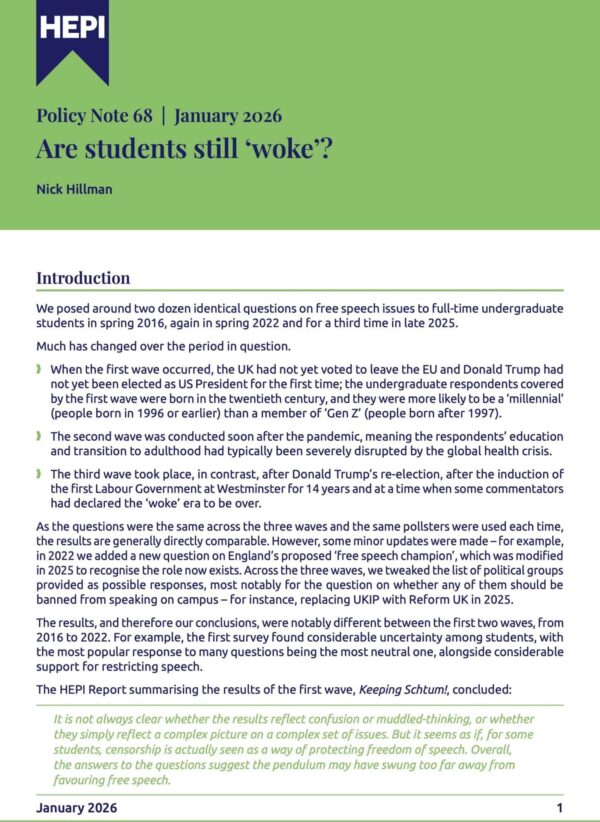What the next generation of entrepreneurial university leaders need to know
The higher education sector is navigating one of the most challenging periods in its history, marked by financial uncertainty, rapid technological transformation, demographic shifts and rising public and political scrutiny. A new collection of 10 essays published today by the Higher Education Policy Institute (HEPI) and curated by the National Centre for Entrepreneurship in Education (NCEE), Why Entrepreneurial Leadership Now? (HEPI Report 190), explains the urgent need for a shift towards more entrepreneurial approaches and offers a compelling call to action.
The collection opens with the results of a new survey of higher education leaders, showing the scale and nature of the challenges in generating income and how people are responding to the increasingly complex and uncertain environment. The authors of the subsequent chapters – three by vice-chancellors, five by pro-vice-chancellors and one by a provost – argue entrepreneurial leadership should move from the margins to the mainstream, offering not only survival but renewed relevance and public value and ensuring students, staff and communities are served effectively. The collection reflects a sense of optimism among leaders as well as a belief in the continuing transformative power of higher education institutions.
The report calls for a new kind of leadership – one that is bold, collaborative and embedded in the wider world. Entrepreneurial leaders, it argues, are essential to reshaping the role of universities as engines of opportunity, inclusion and growth. The essays demonstrate the shared optimism that, even in a time of disruption, universities can lead positive change.
Ceri Nursaw, Chief Executive of NCEE, said:
‘The UK higher education sector is at a pivotal juncture, where financial strain and technological disruption force a rethinking of institutional purpose. Entrepreneurial leadership must become the norm – not the exception – if universities are to act as economic powerhouses and public institutions that remain relevant and trusted. This collection serves both as a reflection on today’s realities and a powerful call to action.’
The 10 chapters in the report are listed below, with a short extract from each.
1. Pressure, resilience and sustainability – the 2024 NCEE leadership survey by Dr James Ransom, Head of Research at NCEE:
‘The 2024 survey reveals a higher education sector under significant pressure, particularly financial, yet one where leaders remain largely confident in their ability to adapt – even as they recognise the need for substantial institutional change and the growing importance of technological and sustainability challenges.’
2. Insider? Outsider? Surely it does not matter if it works by Professor Ken Sloan, Vice-Chancellor and Chief Executive Officer at Harper Adams University:
‘Higher education institutions have always faced in different directions, but currently it can feel like there is not a coherent view from government as to what universities should do and what they are for. In the end, they are not a series of initiatives, programmes and projects. Higher education providers work as integrated and holistic institutions. They will never fulfil their potential unless they are steered and regulated as such.’
3. Partnering for impact by Adam Doyle, Associate Pro-Vice-Chancellor for Careers and Employer Engagement at University of East London:
‘Despite the issues facing higher education as a sector, the trust and regard most people hold for universities make them an obvious leader in place. … Decades of research and community engagement have led to a wealth of knowledge of community needs, the challenges they face and the policies that are intended to provide support. Meanwhile, government at all levels is increasingly expecting universities to deliver economic growth.’
4. Systems reform based on new models of inclusive growth by Andy Salmon, Pro-Vice-Chancellor External at Bath Spa University:
‘We need to address the mega-trends of demographic, technological and green revolutions. By 2050, one in four of the UK population will be over 65. Currently, the fertility rate in England and Wales is 1.44. In technology, STEM-based jobs will grow significantly, but so will human-centred creative roles in an AI world. The impact of green sustainability is still something we struggle to grasp in scope or impact.’
5. Leadership in place by Professor Jane Robinson, Pro-Vice-Chancellor, Engagement & Place at Newcastle University
‘No university is an island. But for many university leaders, a disproportionate amount of time is taken up handling day-to-day internal management pressures rather than looking beyond their walls. While this is understandable in the current febrile environment, it is more important than ever to take the time to understand and respond to the external environment.’
6. How should we prepare students for the future? by Sara Spear, Provost and Chief Academic Officer at St Mary’s University, Twickenham
‘There needs to be sufficient flexibility within institutional policies to allow subject areas the freedom to enact engaged learning in the way most suitable for their discipline and student cohorts. For example, our Creative Arts programmes involve students in local community arts projects, while the Allied Health programmes include placements in hospitals and physiotherapy clinics as well as assistance for charities providing health resources in the community.’
7. AI – A leadership imperative by Professor Liz Bacon, Principal and Vice-Chancellor at Abertay University
‘While AI may generate savings in the long run, the initial costs may pose a challenge in today’s constrained financial environment. Nevertheless, integrating AI into the student and staff experience is no longer optional – it is essential to staying relevant and cannot be ignored. While leaders may not have every detail mapped out, they must develop a vision for how AI will transform both on-campus and digital experiences.’
8. Leadership in challenging times by Socrates Karidis, Pro-Vice-Chancellor and CEO at Coventry University London
‘The first step is the recognition that we are slow, siloed and often inefficient organisations with a level of internal resistance to change, which sometimes becomes very difficult, if not impossible, to manage.’
9. International higher education leadership: it’s all about the people, people! by Judith Lamie, Pro-Vice-Chancellor for International Engagement at Swansea University
‘Higher education, international higher education and education more broadly are not merely transactional. At their very heart are people. It is all about the people, people; don’t forget that and you should be just fine.’
10. Degrees of disruption: rewiring universities as economic powerhouses – why universities must embrace entrepreneurial leadership by Amanda Broderick, Vice-Chancellor and President at the University of East London
‘Entrepreneurial leadership demands more than rhetoric – it requires bold and timely decisions backed by meaningful action. Too often, institutions get caught in cycles of consultations, pilots and stakeholder engagement without ever making the leap. But credibility comes from follow-through. If we want to build trust with staff, students, partners and the public, we must be willing to act with conviction and resource our commitments accordingly.’
Notes to editors
- HEPI was established in 2002 to influence the higher education debate with evidence. We are UK-wide, independent and non-partisan. We are funded by organisations and higher education institutions that wish to support vibrant policy discussions, as well as through our own events. HEPI is a company limited by guarantee and a registered charity.
- NCEE (National Centre for Entrepreneurship in Education) supports universities to be more enterprising and entrepreneurial through leadership programmes and developing a thriving global community of entrepreneurial universities.
- A webinar launching the publication will take place Thursday, 19 June 2025, 12.00-13.00 (UK time). Find out more at www. ncee.org.uk/why-entrepreneurial-leadership-now/ or register to join here bit.ly/4kKpyi0.







Comments
Add comment